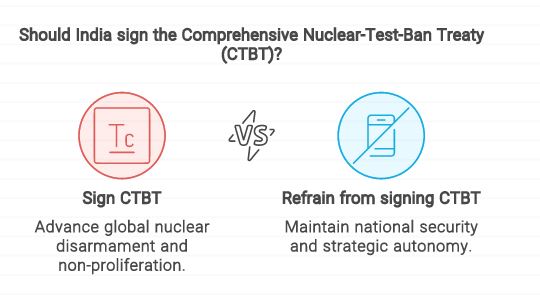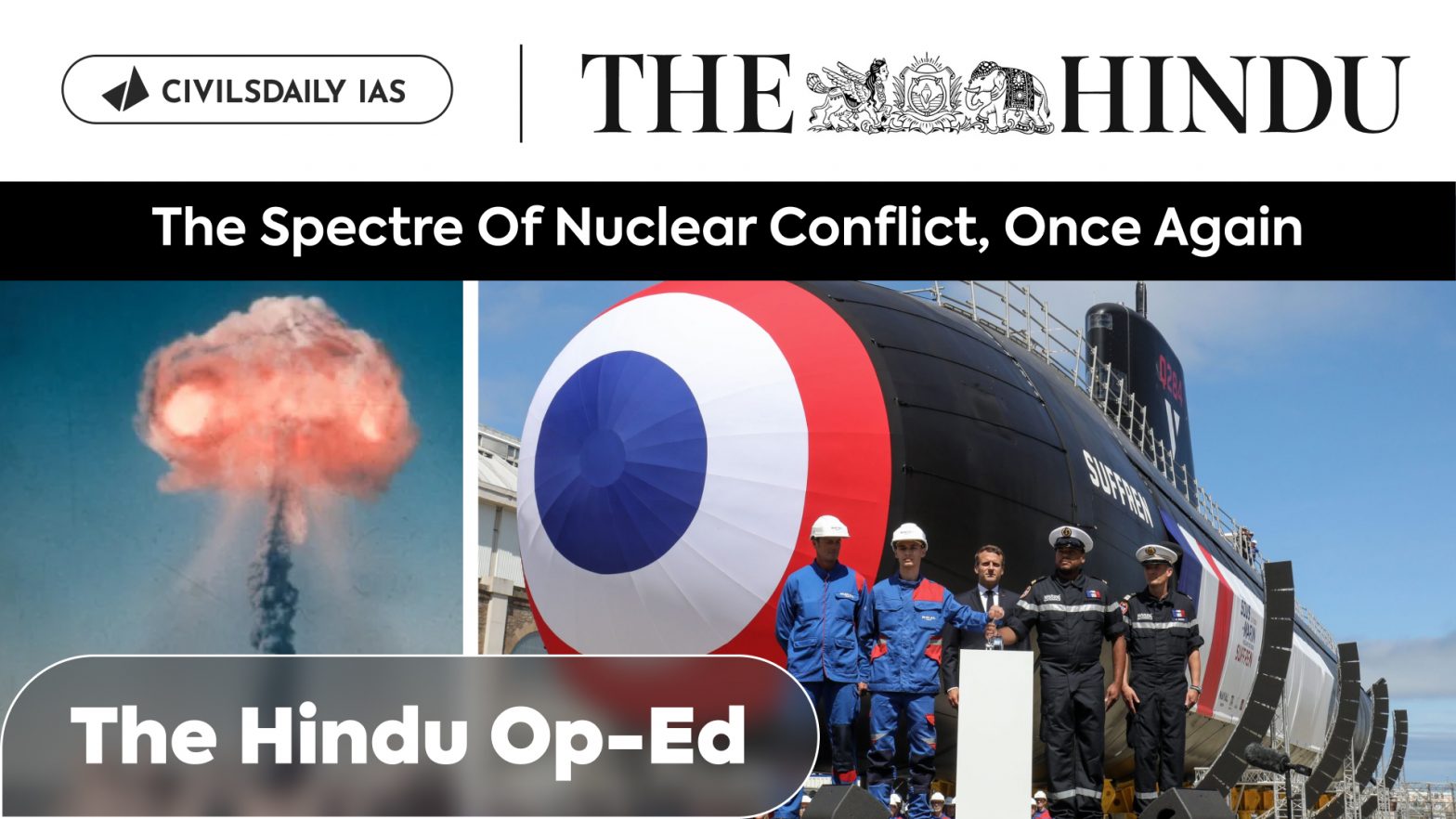| PYQ Relevance: Mains: Q) With growing energy needs should India keep on expanding its nuclear energy programme? Discuss the facts and fears associated with nuclear energy. (250 Words, 15 Marks) (UPSC CSE 2018) Q) In what ways would the ongoing US-Iran Nuclear Pact Controversy affect the national interest of India? How should India respond to its situation? (250 Words, 15 Marks) (UPSC CSE 2018) Prelims Consider the following countries (UPSC CSE 2015) 1) China 2) France 3) India 4) Israel 5) Pakistan Which among the countries given above are Nuclear Weapons States as recognized by the Treaty on the Nonproliferation of Nuclear Weapons, commonly known as the Nuclear Non-Proliferation Treaty (NPT)? (a) 1 and 2 only. (b) 1, 3, 4 and 5 only (c) 2, 4 and 5 only (d) 1, 2, 3, 4 and 5 |
Note4Students:
Prelims: Global Issues; Nuclear Non-Proliferation Treaty (NPT);
Mains: Global Security Issues; Nuclear Policies;
Mentor comment: When each country pursues its security without regard for others, we create global insecurity that threatens us all. Almost eight decades after the incineration of Hiroshima and Nagasaki, nuclear weapons still represent a clear danger to global peace and security, growing in power, range, and stealth. States possessing them are absent from the negotiating table, and some statements have raised the prospect of unleashing nuclear hell — “threats that we must all denounce with clarity and force.” Moreover, emerging technologies such as artificial intelligence and cyber and outer space domains have created new risks. We must find a way back to the negotiating table to fully implement the New Measures for the Further Reduction and Limitation of Strategic Offensive Arms or START Treaty.
Let’s learn.
–
Why in the News?
The leaders of France and Russia have raised alarm bells globally with tensions rising between major powers and the threat of nuclear weapons being used.
| Background: French President Macron has warned of an “apocalyptic vision” and the danger of nuclear “annihilation” due to Russia’s invasion of Ukraine. He plans to raise the nuclear aspect at an upcoming European meeting. Russian President Putin has stated that Russia’s nuclear forces are always on alert and that Moscow will not tolerate Western threats. Russia has also revoked its ratification of the Comprehensive Nuclear Test Ban Treaty. These statements reflect rising nuclear tensions between Russia and the West over the war in Ukraine. The international community has expressed concern over Russia’s nuclear posturing. |
How does the specter of Nuclear conflict raise a Global concern?
- Firstly, the absence of influential global leaders on the brink of a potential nuclear threat of war.
- Russia is “ready for nuclear war” and would use such weapons if its sovereignty is threatened.
- China has recently completed sea trials for an aircraft carrier fitted with electromagnetic catapults and is well on its way to building a fourth carrier.
- Secondly, the prevailing economic turmoil across many regions in the world has exacerbated the situation, making the prospect of nuclear war more alarming.
The potential consequences of a nuclear war are catastrophic and far-reaching:
- Immediate Effects
- Incinerate cities: Intense heat and radiation would incinerate cities within the blast radius leaving millions would suffer fatal burns, blindness, internal injuries, and radiation poisoning.
- Burden on Healthcare services: Hospitals and emergency services would be overwhelmed and unable to respond to the massive number of casualties.
- Long-Term Effects
- Economic Collapse: Radioactive fallout would expose survivors to dangerous radiation levels. Electromagnetic pulses could cripple electrical grids and modern technology.
- Potential human extinction: Nuclear winter caused by soot and debris in the atmosphere could lead to global famine, killing billions of people.
- Environmental Devastation: Large parts of the Earth could become uninhabitable due to radiation and climate changes. Contaminated Oceans and the extinction of much of Earth’s biological life are some of the long-lasting consequences.
| BACK2BASICS About the Comprehensive Nuclear-Test-Ban Treaty (CTBT): The CTBT is a multilateral treaty aimed at prohibiting all nuclear explosions, whether for civilian or military purposes, in all environments. It was adopted by the United Nations General Assembly in 1996 but has not yet entered into force. The treaty requires ratification by eight key nations, including China, India, Pakistan, North Korea, Israel, Iran, Egypt, Russia, and the United States, which still need to ratify it for it to become effective. India avoids the signing of CTBT as it would undermine its National security and Strategic Autonomy, as it would constrain its ability to conduct nuclear tests. The CTBT establishes a global monitoring system to verify compliance and allows for on-site inspections of suspicious events to ensure adherence to its provisions.The treaty’s primary goal is to end nuclear weapon test explosions and promote nuclear disarmament and non-proliferation efforts globally. |

The Recent Discussion at the Hoover Institution:
- The discussion focused on the U.S.-India civil nuclear deal (2005-08) and its impact on bilateral relations, despite the current nuclear tensions in Europe.
- The deal brought a fundamental change in U.S.-India relations, with relevance to resolving current disputes.
- India and the U.S. made significant concessions to negotiate the deal:
- India agreed to separate its nuclear program and accept safeguards, export controls, and a testing moratorium.
- The U.S. amended laws, obtained NSG approval, and helped India get an IAEA safeguards agreement.
- The deal lifted roadblocks preventing India from joining the global nuclear regime, giving it a status similar to a nuclear weapon state under the NPT.
Conclusion: The discussions at the Hoover Institution seemed to be that the deal had even more significance than merely an arrangement about revising India’s nuclear status. From India’s standpoint, the India-U.S. nuclear deal originated from India’s desire to obtain high-grade uranium from outside to complement its energy requirements, the deal confirms that nuclear energy could be a major resource for peaceful purposes.

